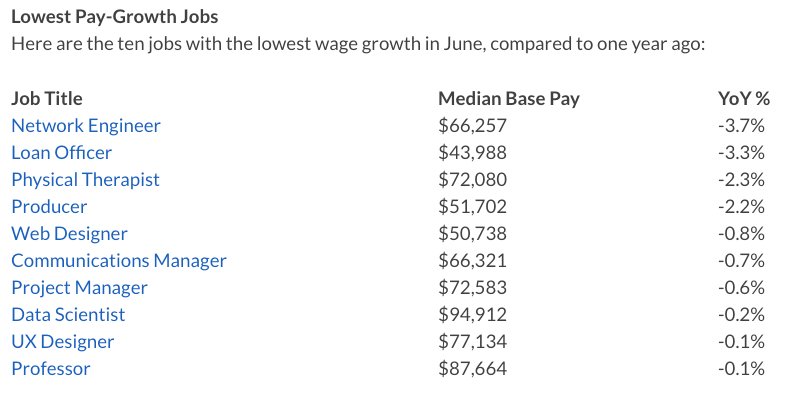Labor shortages are raising wages in a variety of blue-collar jobs, says Glassdoor, a recruitment and wage-tracking company.
“With the economy running hot, we’re finally starting to see pay raises for many of America’s lowest-paying jobs,” said a July 2 statement from the firm:
According to data from Glassdoor, jobs with the fastest pay growth in June included e-commerce roles such as warehouse associate (up 6.8 percent to $43,961 per year), material handler (5.1 percent to $36,179 per year) and truck driver (up 7.3 percent to $54,659 per year), as well as several lower-paying jobs including retail key holder (4.9 percent to $29,746 per year), security officer (4.7 percent to $35,554 per year) and bank teller (8.1 percent to $31,108 per year).
Wages for cashiers rose by 3.4 percent over the prior 12 months.
In contrast, wages lagged in several prominent college-graduate careers, said Glassdoor:
These gains are offset by inflation, which is running about 2 percent in during the 12 months up to July 2018. That rate means a wage gain of 6 percent is a 4 percent gain in buying power. It also means that a salary loss of 2 percent is a 4 percent loss of spending power.
Overall, said Glassdoor:
Wage growth has since recovered in 2018, along with the improving economy, with pay growth rising each month this year. June’s 1.6 percent pace is the fastest wage growth we’ve recorded since October 2017.
Still, the 2018 wage gains are small and come after decades of flat wages caused, in part, by the government’s high-immigration policies.
Four million Americans turn 18 each year and begin looking for good jobs in the free market — but the government provides green cards to roughly 1 million legal immigrants and temporary work-permits to roughly 3 million foreign workers.
The Washington-imposed economic policy of economic growth via mass-immigration shifts wealth from young people towards older people by flooding the market with foreign labor. That process spikes profits and Wall Street values by cutting salaries for manual and skilled labor offered by blue-collar and white-collar employees. The policy also drives up real estate prices, widens wealth-gaps, reduces high-tech investment, increases state and local tax burdens, hurts kids’ schools and college education, pushes Americans away from high-tech careers, and sidelines at least 5 million marginalized Americans and their families, including many who are now struggling with opioid addictions.
President Donald Trump’s campaign to limit legal and illegal immigration is nudging up wages and salaries for Americans in various locations and careers around the country. The beneficiaries include new employees, African-American bakers in Chicago, Latino restaurant workers in Monterey, Calif., disabled people nationwide, high schoolers, resort workers in Hilton Head, construction workers, Superbowl workers, the garment industry, and workers at small businesses, and even Warren Buffett’s railroad workers.
Democrats want more immigrants because they expect the immigrants will vote for big-government progressive policies. Business groups — including those with close ties to the GOP — want more immigration because it helps investors by cutting wages, boosting consumption, and spiking real-estate prices. In practice, the federal government’s immigration policy inflates the supply of labor — and so reduces the cost of labor — to help boost company sales and investors’ returns.



COMMENTS
Please let us know if you're having issues with commenting.